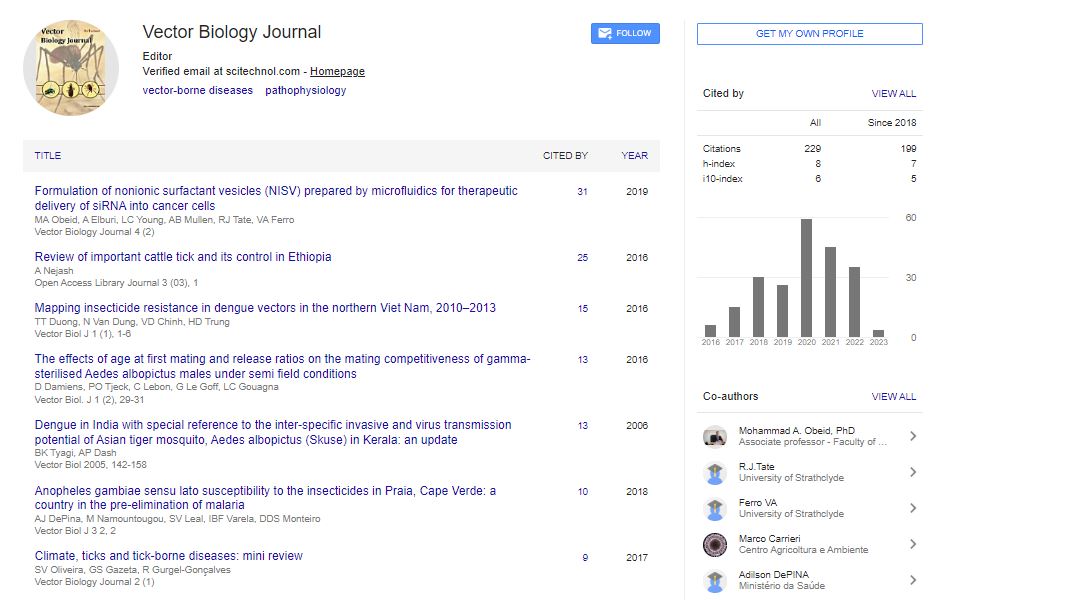Commentary, Vector Biol J Vol: 8 Issue: 4
Examining the Global Challenge of Malaria and its Prevention, and Treatment Methods
Robin Mark*
1Department of Biology, University of Copenhagen, Copenhagen, Denmark
*Corresponding Author: Robin Mark,
Department of Biology, University of
Copenhagen, Copenhagen, Denmark
E-mail: mark.ro@gmail.com
Received date: 21 November, 2023, Manuscript No. VBJ-24-127807;
Editor assigned date: 23 November, 2023, PreQC No. VBJ-24-127807 (PQ);
Reviewed date: 07 December, 2023, QC No. VBJ-24-127807;
Revised date: 15 December, 2023, Manuscript No. VBJ-24-127807 (R);
Published date: 22 December, 2023, DOI: 10.4172/2473-4810.1000276.
Citation: Mark R (2023) Examining the Global Challenge of Malaria and its Prevention, and Treatment Methods. Vector Biol J 8:4.
Description
Malaria is a formidable adversary that has plagued humanity for centuries, continues to be a significant public health concern, particularly in regions with limited access to healthcare resources. This parasitic disease, transmitted through the bite of infected Anopheles mosquitoes, poses a significant risk to millions of people around the world, mostly in tropical and subtropical areas. Despite considerable efforts to prevent malaria, it remains a major cause of morbidity and mortality, with an estimated 229 million cases and 409,000 deaths reported globally in 2019, according to the World Health Organization (WHO).
Understanding the complicated dynamics of malaria is essential for developing effective preventative and treatment measures. The disease is caused by Plasmodium parasites, with Plasmodium falciparum and Plasmodium vivax being the most common organisms affecting humans. Once inside the human body, these parasites multiply within red blood cells, leading to a wide range of symptoms including fever, chills, headaches, and, in severe cases, organ failure and death.
Preventing malaria transmission depends heavily on vector control measures. Long-Lasting Insecticidal Nets (LLINs) and Indoor Residual Spraying (IRS) are among the primary methods used to reduce mosquito populations and prevent infections. Additionally, environmental management techniques, such as remove the stagnant water where mosquitoes develop, plays an important role in reducing transmission. However, the effectiveness of these interventions can be prevented by factors such as insecticide resistance and socio-economic challenges in implementing widespread control programs.
Furthermore, the development of antimalarial drug resistance poses a significant hazard to malaria control efforts. Over time, Plasmodium parasites have shown an ability to adapt and become resistant to commonly used antimalarial medications, such as chloroquine and sulfadoxine-pyrimethamine. These requirements precede advancement in the development of new medications for effectively combating infections that are resistant.
In recent years, considerable progress has been made in the development of malaria vaccines. The most advanced vaccine candidate, RTS, S/AS01, has shown effective results in clinical trials, particularly in protecting young children against severe malaria. While this vaccine represents a significant breakthrough, its efficacy varies across different malaria-endemic regions, and further study is required to improve its efficacy and deployment.
Beyond biomedical interventions, addressing the socio-economic determinants of malaria is essential for sustainable control efforts. Poverty, inadequate access to healthcare, and environmental factors such as deforestation and climate change contribute to the persistence of malaria in many endemic regions. Comprehensive malaria control methods include strengthening health systems, increasing access to education, and improving community participation. Initiatives such as the Global Fund to Fight AIDS, Tuberculosis, and Malaria and the President's Malaria Initiative have played essential roles in mobilizing resources and supporting malaria control efforts in endemic countries. However, sustained political commitment and investment are needed to ensure continued progress in the fight against malaria.
Malaria remains a significant global health challenge that requires multifaceted techniques for effective control and eventual eradication. Advances in scientific research, combined with strengthened health systems and socio-economic development, are essential for reducing the responsibilities of malaria on vulnerable populations. By coordinating across industries and countries, we can work towards a malaria-free world in which future generations of people remain no further threatening by this historical disease.
 Spanish
Spanish  Chinese
Chinese  Russian
Russian  German
German  French
French  Japanese
Japanese  Portuguese
Portuguese  Hindi
Hindi 